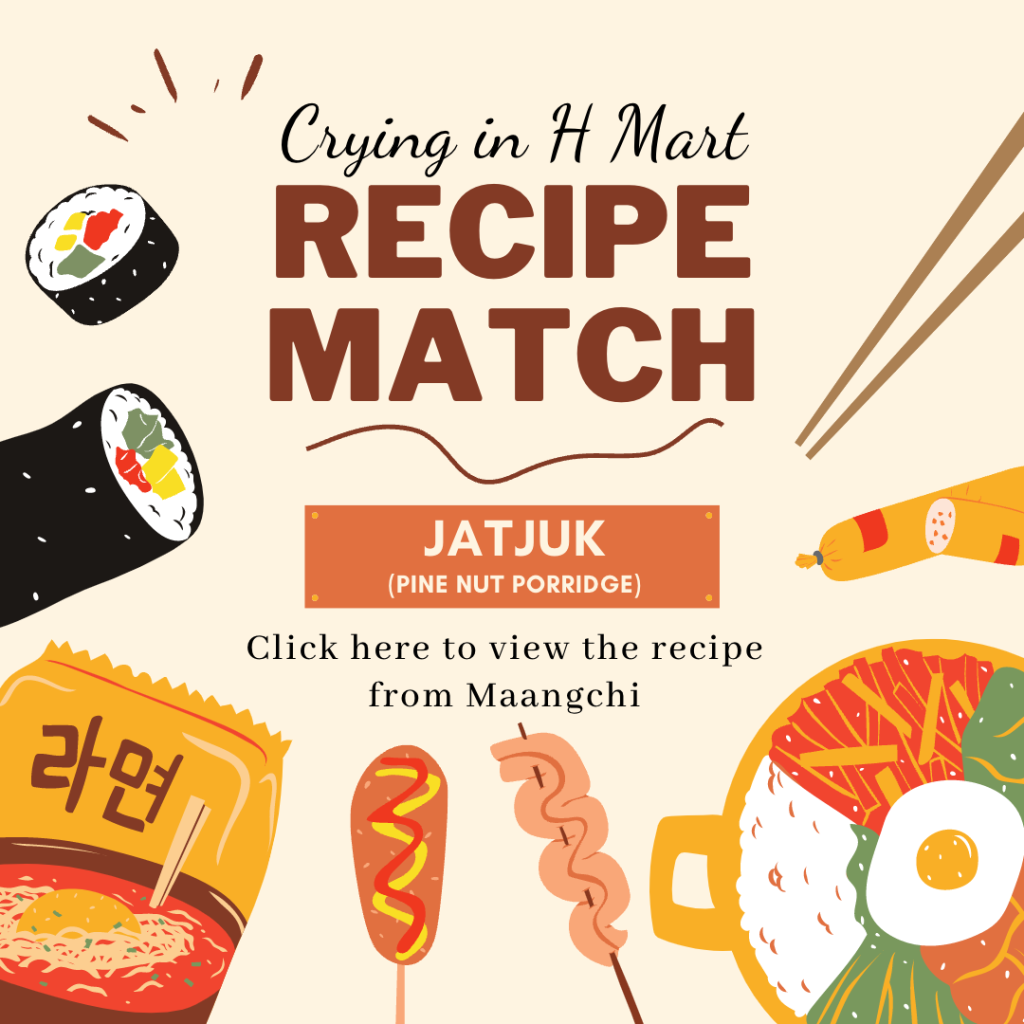Crying in H Mart
By Michelle Zauner
Jatjuk is a Korean pine nut porridge that is often given to people who are sick. Not only is it nutritious, but it is easy to digest. It appears several times in Zauner’s memoir– first as a staple of her mother’s diet while she was battling cancer, and later as a comfort food that Zauner indulged in after her mother’s death. While Zauner described MANY delicious dishes throughout her book, I decided to choose this one to represent Zauner’s path to healing. Plus, this is exact recipe from Maangchi that Zauner references in the book! Cook this simple dish for your book club to comfort you as you discuss Zauner’s grief and possibly relate to her experiences. Click here to view the recipe from Maangchi.

In her book, Crying in H Mart, Michelle Zauner describes an adage that her mother imparted on her: “Save 10 percent of yourself.” She explains that the phrase means that you should never completely surrender who you are to someone, even if you love them. This gives a person “something to fall back on” in case they leave you. While Zauner may have held back a portion of her story from the public, Crying in H Mart feels like a desperately raw tell-all of what it is like to see someone you love suffer through a terminal illness. Unfortunately, we often have to confront the grief that emerges through the ashes of despair.
The book begins with an honest view of Zauner’s relationship with her mother, Chongmi. Chongmi was Korean and unpassionately married to Michelle’s American father, Joel. The two met in Japan, where Joel was working to sell cars to U.S. military members. Chongmi’s Korean ideals often conflicted with Michelle’s western upbringing, causing the two to clash. During the course of the book, Michelle begins to realize that her mother’s criticisms and uncommunicated feelings were actually a form of unrelenting love. It pained Chongmi to see Michelle’s bad decisions. She would go out of her way to make sure Michelle could forget the pain reaped from her choices. Still, the two had a contentious relationship when Michelle was a teenager, and they were just beginning to heal when Chongmi received her cancer diagnosis.
Once Chongmi was diagnosed with cancer, Michelle threw herself into being the “perfect” daughter. She tried to make up for the rough times she had with her mom by taking care of her and making all her favorite Korean dishes. Unfortunately, Michelle struggled with Korean cooking and had to eventually turn to her mother’s friends to provide that service. As her mother’s condition grew worse, Michelle desperately tried to hold on to her in any way possible. The book addresses the harsh realities of a cancer patient’s day-to-day life as well as the helplessness family members often feel as they watch their loved ones suffer. As Chongmi began to deteriorate, Michelle realizes that she may not have her mother for much longer. She asks her boyfriend, Peter, if they can get married so that her mother can attend the wedding. Unfortunately, this would be Chongmi’s last major event. She passed away two weeks after the wedding.
If you have lost a parent, you will probably relate to the deep ache that permeates Michelle after her mother’s passing. Her relationship with her father becomes awkward and eventually non-existent. However, Zauner highlights the everyday activities that ignite her memory of Chongmi. Many of Zauner’s childhood memories revolve around food. Food becomes the catalyst behind Zaunder’s healing, in fact. It represents specific memories, everyday activities, and a sense of belonging. Thus, H Mart, which is an Asian grocery story found throughout the United States, becomes the mecca of her grief-filled emotions. Food keeps Chongmi’s spirit alive, and its presence will cement Zauner’s memories of her mother while helping her heal from her loss.
While I enjoyed this book, I wouldn’t say that there was anything earth-shattering about it. Yes, the food sounded amazing. Yes, it’s a painfully honest portrayal of the author’s experience and subsequent grief. Yes, caretaking for a person with a terminal illness can be brutally hard. I can respect all of that while noting that there was nothing that set this memoir apart from others that involve the loss of a loved one. It was a little bland. While I am excited to talk about it in my book club and explain my emotions when my father passed away three years ago, I doubt I will recommend this book to many friends.
Rating: ⭐️⭐️⭐️
My Rating System Explained 5 Stars ⭐️⭐️⭐️⭐️⭐️: This was an amazing book, and I can't stop thinking about it. It impacted me emotionally or changed my perspective. My thoughts keep flickering back to it at random times throughout the day. I will absolutely recommend it to my friends or to one of my book clubs. 4 Stars ⭐️⭐️⭐️⭐️: This was a really good book. Parts of it stuck with me, and I might mention it in a conversation. There is a high likelihood that I will recommend it to my friends or to one of my book clubs. 3 Stars ⭐️⭐️⭐️: I liked this book. It allowed me to escape from reality for a while. While I might tell somebody about it if I think it will interest them, I will probably not suggest it to one of my book clubs. 2 Stars ⭐️⭐️: There's something about this book that I didn't like. I wasn't willing to go all the way down to a one-star rating, but I'm definitely not digging it. I may recognize that this book is not for me, but it might be for other people. I will not recommend it to my friends or one of my book clubs. 1 Star ⭐️: My rarest rating. I really didn't like this book. Something in the story line upset me, and I probably "hate-read" the majority of the book. Not only will I not recommend it, but I will actively tell people that I did not like it.
